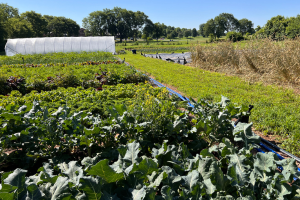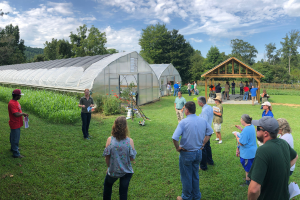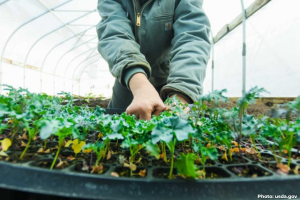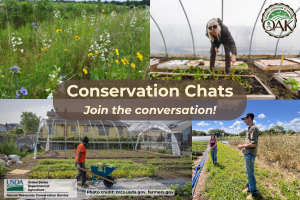|
Land Stewardship Through ConservationHealthy soil is the foundation of organic and sustainable farming, yet successful farming and land stewardship depend on the health of all natural resources on the farm and its surroundings. Soil, water, plant diversity, wildlife, pollinators and human actions are all critical elements in thoughtful land conservation planning. OAK’s Conservation Outreach program provides one-on-one assistance for Kentuckians interested in adding conservation practices to their land or farm management.This program is supported by a cooperative agreement with the U.S. Department of Agriculture (USDA)’s Natural Resources Conservation Service (NRCS).
Farmer and Landowner ResourcesPeer Learning and Community Events
One-on-One Conservation SupportSchedule a time with Mad Marchal, OAK's Conservation Outreach Coordinator. to explore conservation planning, financial resources and technical assistance. Get Started Today!
Conservation Resources
Conservation Education EventsFarmer Field Days and Online Gatherings
Webinar: Conservation Resources for Organic and Organically-Managed FarmsOnline -- February 18, 2026, 12 - 1 pm ETThe USDA’s Natural Resources Conservation Service (NRCS) provides assistance to support farmers adopting conservation practices, which can benefit certified organic farms, farms in transition to organic certification or those using/considering organic practices. In this free webinar, OAK conservation staff and NRCS staff share multiple ways that producers, growers and graziers can work with NRCS on successful conservation practices, uniquely tailored contracts, organic transition assistance and whole-farm planning.
Henry County farmer Joseph Monroe of Valley Spirit Farm will share his experience working with NRCS since 2016 to create effective rotational grazing systems with improved forage, increase crop pollination, support plant and wildlife diversity and create sustainable on-farm watering systems for livestock and crops.
This free online gathering offers something for everyone: participants with previous NRCS experience will gain insight into how to optimize future contracts, while those new to NRCS will learn how to build a relationship with NRCS. This webinar will be recorded.
This event is supported by a cooperative agreement with the U.S. Department of Agriculture (USDA)’s Natural Resources Conservation Service (NRCS). OAK's Farmer Education program is supported by the Kentucky Agricultural Development Fund (KADF). Registration fees are waived for this event; registration is required. Conservation Education Past EventsFarmer Field Days
Cultivating the Commons: Urban Food Forest for Ecological and Community Health
Kilrush Food Forest, Lexington KY -- October 28, 2025, 1 - 4 pm ET
In 2020, Lexington design firm Geomancer Permaculture launched a legacy project along an urban Lexington floodplain to support the ecological health of Wolf Run Creek through the restoration and development of an agriculturally productive native landscape. A three-acre parcel of public land, Kilrush Food Forest is evolving into a multi-purpose riparian buffer which restores biodiversity, supports the watershed’s water quality and provides nourishment for the surrounding community.
Geomancer Permaculture, founded by Leandro “Nachie” Braga, has cultivated a broad community of volunteers, supporters, allied organizations and neighbors to share in the creation of a collective public endeavor, remove invasive plants and plant and preserve native or naturalized fruit, nut and berry trees, edible and medicinal native plants and pollinator-supporting wildflowers. In collaboration with the Fayette County Soil and Water Conservation District, Kilrush Food Forest has developed into a demonstration site of natural resource practices and an outdoor classroom for community education.
Join this Field Day to experience Kilrush Food Forest’s integration of agroforestry and permaculture practices, explore the realities of building a community project on public land, participate in demonstrations of pruning and pollarding and learn about resources for technical assistance and financial support available for conservation practices throughout Kentucky. This event was supported by a cooperative agreement with the U.S. Department of Agriculture (USDA)’s Natural Resources Conservation Service (NRCS). OAK's Farmer Education program is supported by the Kentucky Agricultural Development Fund (KADF).
Click HERE for Kilrush Field Day Resources
Rotational Grazing, Silvopasture and Farming with Native EcosystemsCedar Creek Farm, Somerset, KY -- September 18, 2025, 1 - 4 pm ET
Join this OAK Field Day to tour their orchards, native and improved pastures and riparian buffer. Explore the gravity-fed natural and installed livestock watering systems, including in-field water tanks and quick-connect buried lines. Learn how Micah’s simple, electric fencing allows ease of movement between paddocks for healthy rotations. Visit Cedar Creek Farm's 20-year-old native grass pasture managed by prescribed burning and intentional grazing. Master Grazier Greg Brann will join the Field Day to offer pasture and forage insights for soil, livestock and nutrient management. This event is supported by a cooperative agreement with the U.S. Department of Agriculture (USDA)’s Natural Resources Conservation Service (NRCS). OAK's Farmer Education program is supported by the Kentucky Agricultural Development Fund (KADF). Registration fees are waived for this event; registration is required. Click HERE for Field Day Resources
Conservation on an Urban FarmBearFruit & Grow, Louisville, KY -- July 29, 2025
BearFruit & Grow is much more than an urban farm, it’s a community pillar. Out of the turbulence and solidarity of 2020, LeTicia Marshall created an abundant 15-raised-bed backyard garden and youth education program while creating and contributing to food justice efforts throughout Louisville. Five years later, LeTicia stewards four acres in south Louisville along the banks of Pond Creek. Working with the land and its natural resources to support her subsistence and market food production, LeTicia prioritizes ongoing conservation and whole farm ecology in her growing systems and land management, including
Join this Field Day at BearFruit & Grow to tour this urban farm, explore conservation practices and learn from partner agriculture professionals in engaging presentations and activities. This event is supported by a cooperative agreement with the U.S. Department of Agriculture (USDA)’s Natural Resources Conservation Service (NRCS). OAK's Farmer Edcuation program is supported by the Kentucky Agricultural Development Fund (KADF). Registration fees are waived for this event; registration is required.
Click HERE for Field Day Resources
Cover Crops, Perennials and Diversified Plantings: Sustainable Practices for Long-Term Farming - On-Farm Field DaySeedleaf's Headwater Farm, Lexington KY -- April 24, 2025
Join us for this Field Day at Headwater Farm to learn more about Seedleaf’s community farming practices during seasonal crop transitions and the coordinated efforts of growing food and supporting local ecosystems. Learn about Seedleaf’s partnership with USDA’s Natural Resources Conservation Service to support healthy soil-building, improve Elkhorn Creek’s water quality and enhance pollinator habitat. Discover Seedleaf’s cooperative approach with multiple community gardeners on shared land to ensure clarity and coordination in a community space. Experience their techniques for sowing and terminating cover crops (crimping, tarping and mowing) with multiple scales of equipment. Tour Headwater Farm’s garden production to explore seasonal crop choices and management in the field and high tunnel, and learn more about their agroforestry practices and perennial orchards. This event is supported by a cooperative agreement with the U.S. Department of Agriculture (USDA)’s Natural Resources Conservation Service (NRCS). OAK's Farmer Edcuation program is supported by the Kentucky Agricultural Development Fund (KADF). Registration fees are waived for this event; registration is required.
Click HERE for Field Day Resources
Exploring the Ecosystems of Community and ConservationSeedleaf's Headwater Farm, Lexington KY -- September 12, 2024
Join this OAK Farmer Field Day to learn about Headwater Farm’s integration of whole-farm planning and management built on an ethic of community engagement, land stewardship and a long-term vision. Hear from Headwater Farm’s multiple market and subsistence growers using different small-scale production systems on individual plots while maintaining the integrity of the whole farm’s transition to organic certification. Learn more about Headwater’s collaboration with USDA’s Natural Resources Conservation Service (NRCS) in adopting conservation practices that protect the natural resources of Headwater Farm and its local ecosystems - and how OAK and NRCS can help any Kentucky farm to do the same. Thanks to a cooperative agreement with the U.S. Department of Agriculture (USDA)’s Natural Resources Conservation Service (NRCS), registration fees are waived for this event.
Growing on Principles: Soil Health, Farmer Health and Community HealthApostles Garden, Bowling Green, KY -- October 10, 2024
Farming, fellowship and fungi are interconnected at Apostles Garden. On this ½-acre of vegetable production in Bowling Green, Jackson Rolett and his family are creating a collaborative market farm based on soil health, farm and family work-life balance and mission-driven work on their church’s land. Join this OAK Farmer Field Day to learn from Jackson the realities of part-time farming and co-farming, leasing community land, transitioning acreage to organic certification and balancing crop management with time management in year-round farming. Tour their Warren County gardens to see Jackson’s efficient practices of cover cropping, crop rotations and field and tunnel vegetable production - yielding healthy crops and benefiting the natural resources of soil, water and pollinators. Learn how OAK programs can assist growers and farmers in on-farm conservation, organic production and organic transition, and hear from the Natural Resources Conservation Service (NRCS) on financial and technical assistance available for conservation efforts. Thanks to a cooperative agreement with the U.S. Department of Agriculture (USDA)’s Natural Resources Conservation Service (NRCS), registration fees were waived for this event.
Conservation WebinarsConservation, Connection and Capital: Bringing EQIP Support to Your FarmWebinar Recording and Resources -- April 24, 2024
This webinar guided farmers through all they need to know to apply for and implement Environmental Quality Incentives Program (EQIP) support and funding. This free online event provided participants with sure-footed next steps and connections with people who can help, from identifying conservation concerns to completing a successful contract. Click below to access a summary, follow-up resources and the event recording. Learn from OAK staff members, a Natural Resources Conservation Service (NRCS) specialist and experienced farmers Cortney Moses and Paul Dengel. Cortney and Paul shared their farm's story of the EQIP application and funding process and its on-farm benefits for GoodThymes Organic Farm in Williamsburg, KY.
Small Spaces, Whole Ecosystems: Conservation on Small-Scale and Urban Farms
Webinar Recording and Resources -- November 12, 2024
The USDA’s Natural Resources Conservation Service (NRCS) has worked since 1932 to provide farmers with technical and financial support for protecting natural resources on agricultural land. As the culture and landscape of agriculture and working farms evolve, NRCS has adapted with increased programs designed for smaller and urban working lands. With no acreage minimum to qualify and increased payment rates for small acreage, more NRCS technical assistance and financial incentives are now suitable for small-scale and urban growers interested in practicing conservation through cover crops, rainwater harvesting, tree and shrub establishment, windbreaks, pollinator plantings and more! Join this free one-hour webinar to learn details of conservation practices and support available with NRCS. Urban grower Velvet Welch will share her story of working with NRCS to support her small-scale Louisville farm. Conservation and Education Coordinators from the Organic Association of Kentucky (OAK) and Kentucky NRCS Urban Conservationist Nathan Lind will provide details on technical assistance and financial incentives and recommend next steps in working with OAK and NRCS for conservation support. This event is supported by a cooperative agreement with the U.S. Department of Agriculture (USDA)’s Natural Resources Conservation Service (NRCS).
Click Here for Webinar Resources
Conservation ChatVirtual Gathering -- May 20, 2025 |


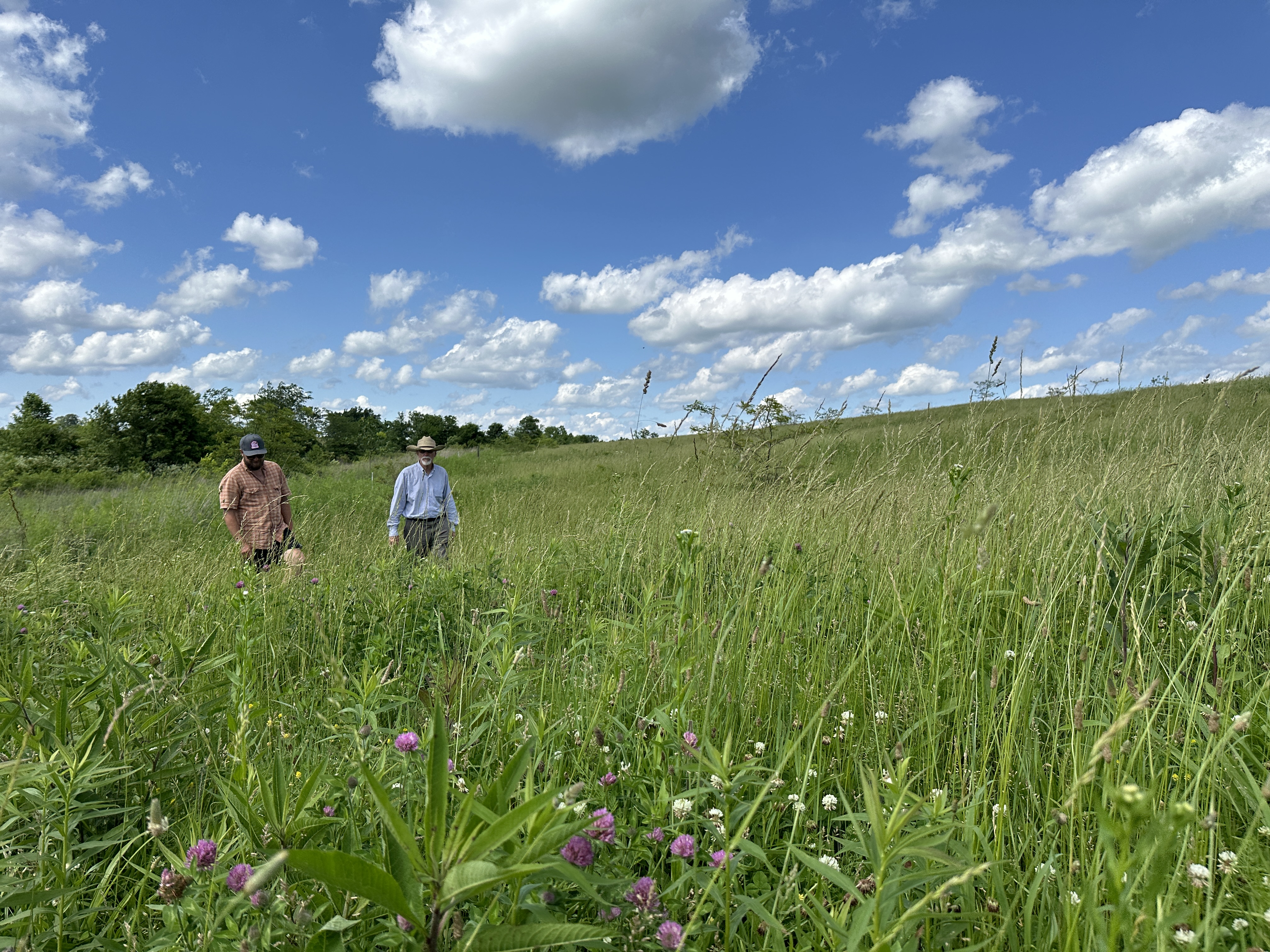

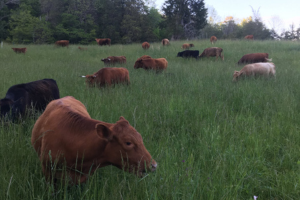
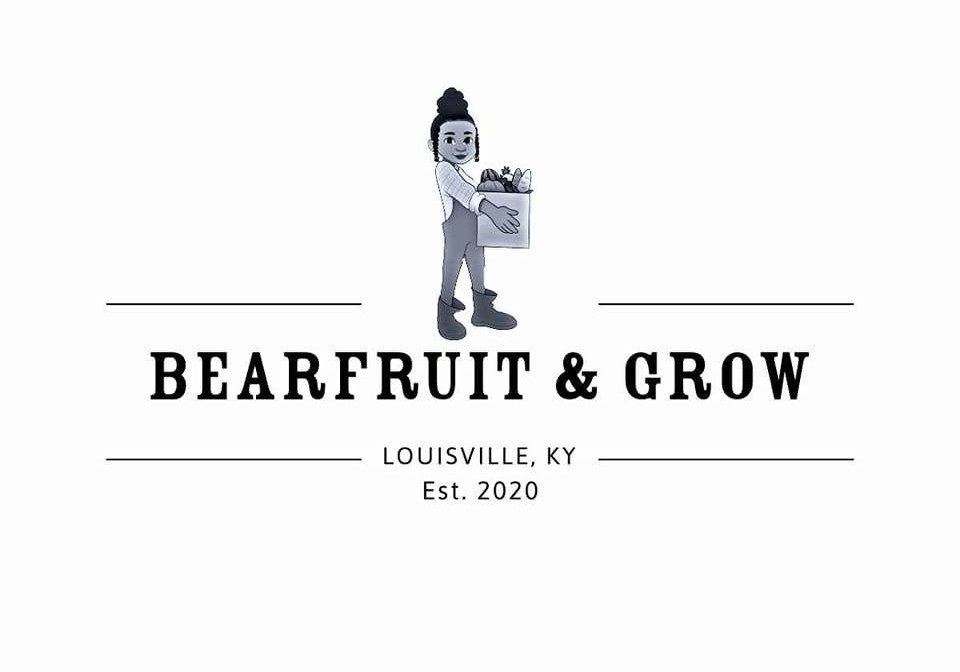
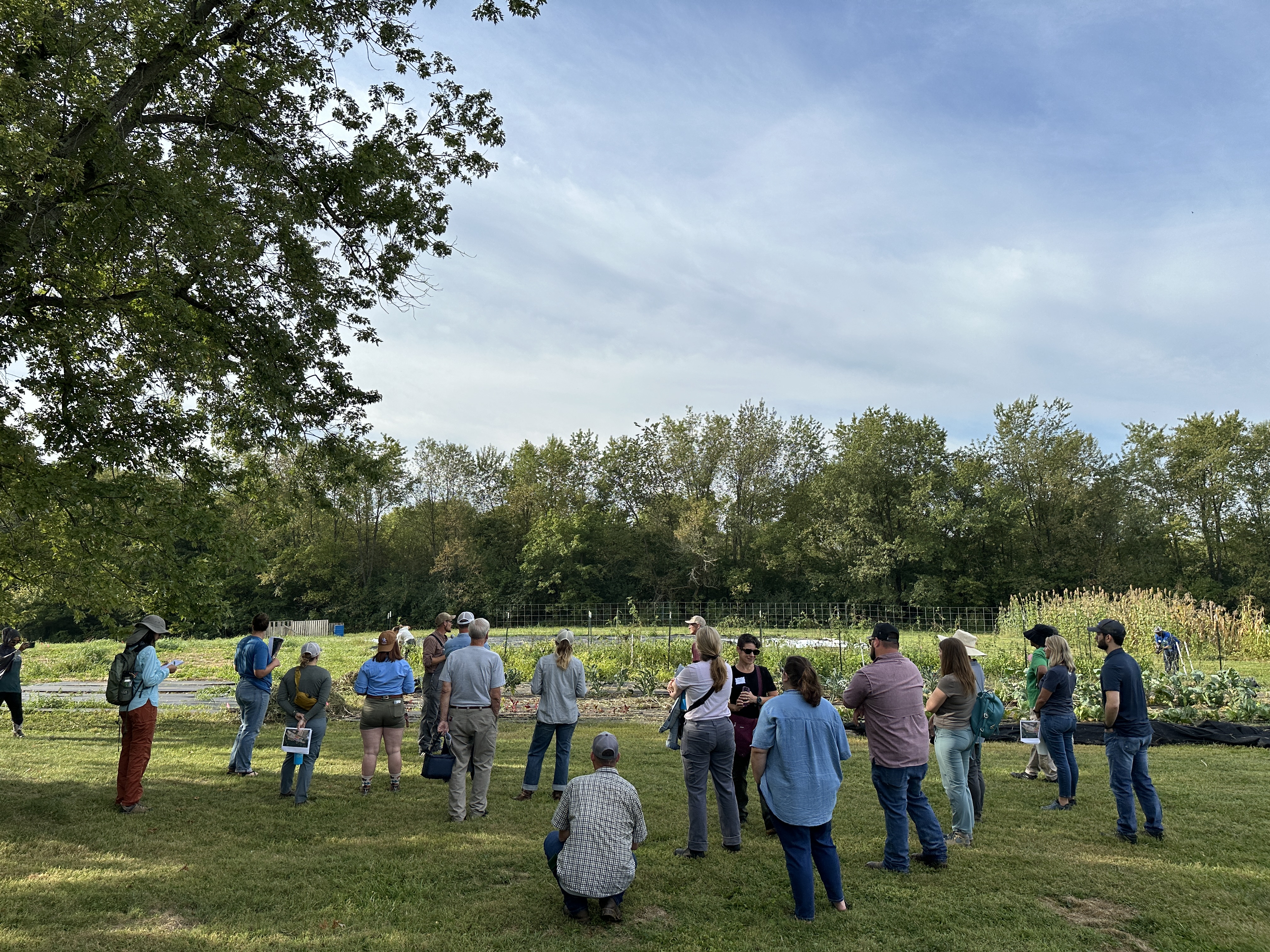 Along the headwaters of the Elkhorn Creek in Northeastern Fayette County, Headwater Farm cultivates nutrient-dense produce for community partners and supports small local agribusinesses in Lexington. On this 30-acre parcel of leased land, Lexington nonprofit Seedleaf provides acreage to small-scale growers, cultivates culturally significant seeds for organic markets and offers community education on organic agriculture and agroforestry.
Along the headwaters of the Elkhorn Creek in Northeastern Fayette County, Headwater Farm cultivates nutrient-dense produce for community partners and supports small local agribusinesses in Lexington. On this 30-acre parcel of leased land, Lexington nonprofit Seedleaf provides acreage to small-scale growers, cultivates culturally significant seeds for organic markets and offers community education on organic agriculture and agroforestry.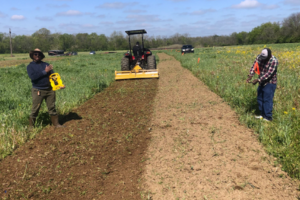 Farms come in all shapes and sizes and involve one farmer or a team of farmers - and sometimes, they’re managed in community.
Farms come in all shapes and sizes and involve one farmer or a team of farmers - and sometimes, they’re managed in community. 